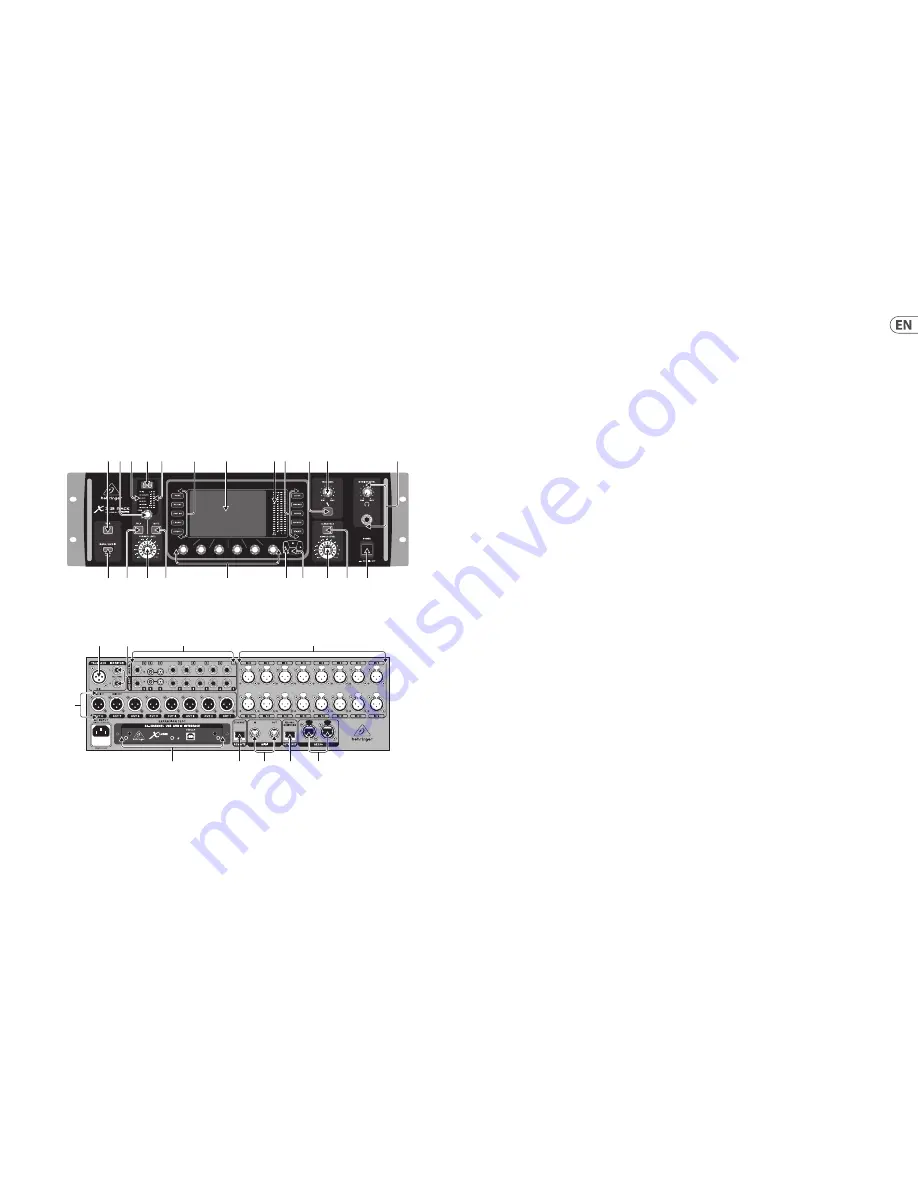
12
X32 RACK DIGITAL MIXER
Quick Start Guide
13
X32 RACK DIGITAL MIXER Controls
(EN)
Step 2: Controls
(1) (3) (4) (5)
(11)
(13)
(17)
(6)
(10)
(16)
(21)
(7)
(8)
(19)
(20)
(9)
(12)
(14) (15)
(18)
(22)
(2)
(23)
(24)
(31)
(26)
(25)
(27)
(29)
(28)
(30)
(10)
(1)
USB button opens the Recorder View on the
MAIN DISPLAY, causing the LED to glow green.
The LED will glow red to indicate access on the
DATA/AUDIO input. An unlit LED indicates no
data access and inactive Recorder View.
(2)
DATA/AUDIO USB input allows connection of
USB flashdrives for firmware updates, loading/
saving scenes and show files, and playing back
or recording WAV files.
(3)
CHANNEL SELECT control cycles through all
channels by turning the knob. By pressing
this knob, you can jump to the next type
of channels.
(4)
CHANNEL TYPE LEDs indicate which type of
channel is currently selected.
(5)
CHANNEL NUMBER display shows the currently
selected channel.
(6)
INPUT METER displays the pre-fader input
level of the selected channel.
(7)
SOLO button routes the currently selected
channel to the monitoring paths. The LED
lights when active.
(8)
CHANNEL LEVEL control adjusts the currently
selected channel’s output.
(9)
MUTE button mutes the currently selected
channel. The LED lights when active.
(10)
MAIN MENU buttons open specific menus on
the MAIN DISPLAY.
(11)
MAIN DISPLAY shows permanent information
about the mixer’s configuration as well as
information about the currently selected
menu.
(12)
DISPLAY ENCODER knobs allow adjustment
and on/off selection of the menu items
indicated at the bottom of the MAIN DISPLAY.
(13)
MAIN METER indicates the Main Mono or SOLO
level in the left meter and the Main Stereo
level on the right.
(14)
PAGE SELECT buttons curse horizontally
in the MAIN DISPLAY and make
Yes / No confirmations.
(15)
LAYER SELECT buttons access different
parameter layers that can be edited by the
DISPLAY ENCODERS.
(16)
TALK button engages the Talkback
microphone. Routing is defined in the
Monitoring Preferences page.
(17)
TALK LEVEL knob sets the Talkback mic gain.
(18)
CLEAR SOLO button lights to indicate that
one of the channels has been Soloed. Press to
deactivate all active solo functions.
(19)
MAIN LR LEVEL knob adjusts the main stereo
output bus.
(20)
ON/OFF button turns the power on and off.
(21)
MONITOR LEVEL knob adjusts the
headphone and monitor output volume.
Connect headphones to the 1/4" front
panel input.
(22)
TALKBACK input connects a talkback
microphone via XLR cable.
(23)
MONITOR outputs send audio to monitor
speakers via 1/4" balanced cables.
(24)
AUX IN and OUT jacks send and receive signals
via 1/4" and RCA connectors.
(25)
XLR OUT jacks send audio via XLR cable.
Output signals are configured on the Routing/
Aux Out page of the MAIN DISPLAY.
(26)
X-USB card provides 32 channels of
input and output via USB cable to and
from any connected personal computer
DAW application.
(27)
ETHERNET connector allows full OSC-based
remote control of the X32 RACK.
(28)
MIDI IN/OUT allows the unit to send and
receive MIDI commands via standard 5-pin
DIN cables.
(29)
ULTRANET connector sends 16 channels of
audio to a P16 monitoring system.
(30)
AES50 A and B connectors allow 96 channels
of bidirectional audio for connection to S16
digital snakes or other X32 family products.
Shielded CAT-5e cable should always be used
for AES50 connections between X32 and
S16 units.
(31)
XLR IN jacks receive inputs via XLR cable.
These inputs feature 16 MIDAS-designed mic/
line preamps with 72 dB of gain range. Each
input has an adjacent red LED to indicate
when 48 V phantom power supply is engaged.








































